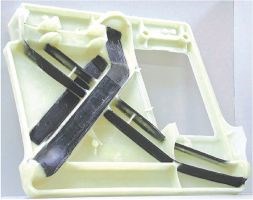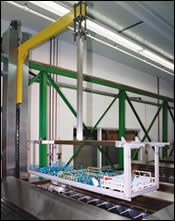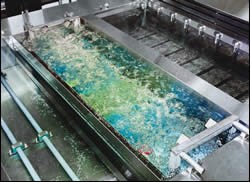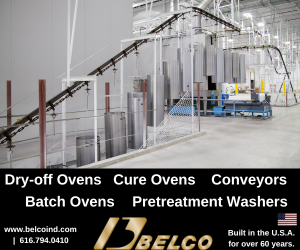Ultrasonic Cleaning "Sounds" Quality Message At ATFAB
When precision services provider ATFAB planned its new 55,000-sq-ft facility in 1998, there was no doubt where their automated ultrasonic parts-cleaning line would go. “We’re not the kind of company that hides cleaning back in a corner.
When precision services provider ATFAB planned its new 55,000-sq-ft facility in 1998, there was no doubt where their automated ultrasonic parts-cleaning line would go. “We’re not the kind of company that hides cleaning back in a corner. Good cleaning is essential to meeting our quality standards, and we reinforced that message by showcasing the cleaning line front and center as you walk in the door,” says ATFAB President Steve Paskan.
Paskan co-founded ATFAB in 1983 in a rented space in Eastlake, Ohio. The company started primarily as a lapping hyprolapping service provider for precise and unusual surface call-outs on metal parts. It expanded into honing, polishing, abrasive flow machining and various types of precision deburring and moved into larger quarters in Mentor, Ohio, before building the new facility in Painesville Township, Ohio, in 1998.
Today, ATFAB services the high purity, fluid control, aerospace, medical, automotive and power transmission industries with a wide range of precision manufacturing services. These include short run production, abrasive bead blasting and abrasive flow machining, electrochemical machining, electropolishing, honing, flat honing, lapping, CNC milling and turning, mass finishing, tumbling, cleaning, inspection and packaging.
Much of the work that ATFAB performs requires unique skill-sets that their customers choose to outsource rather than develop on their own. This can include a process such as removing a burr from a complex geometry (for one customer, ATFAB uses electrochemical machining to burn off the burr at a cross-hole). It might also include flat honing of washers and spacers for the high-purity industry (similar to double disk grinding but less stock removal and not as much heat on the part). ATFAB’s employees bring the necessary experience to these projects with an average length of service of 10.5 years in an environment at ATFAB that not only encourages but also requires cross training in various skill-sets.
“Our mission statement is not just a piece of paper, it is the way we do business. We are committed to providing excellent customer service, creating profitable growth through a strong results approach, treating all people with respect and the synergy of teamwork,” says Paskan. These business practices result in, among other things, employee longevity and the creation of talented job specific teams as customer demands vary.
“By the time parts are shipped to us for precision service, our customers are often facing a time crunch. A job that we quoted for a two-week delivery now has to be done perfectly in three days. The right people and equipment are essential to make this happen,” says Larry Adamic, ATFAB’s quality manager.
Having the right equipment often means developing proprietary machinery and processes on ATFAB’s own premises. One such customized machine polishes critical sealing surfaces in a proprietary process that couples rough and polish into one streamlined, computerized operation that is significantly quicker than a two-step process and totally repeatable. Quickness, repeatability and consistency also apply to the parts-cleaning area where ATFAB faces the challenge of removing a wide variety of soils from an ever-changing group of complex parts and substrates.
In the early days, ATFAB cleaned parts with several chemistries that were highly corrosive and difficult to dispose of properly. Their cleaning equipment consisted of a dozen stand-alone agitation units and soaking tanks as well as several manual-rinsing stations. Parts contained in small metal baskets were moved through the line manually. The whole operation was very labor-intensive that led to operator fatigue, according to Parts-Cleaning Engineer Dale Kordes. Operator fatigue, in turn, caused a lack of repeatability in the cleaning process which led to variations in the cleanliness of the finished product. These factors caused ATFAB to search for a cleaning system that was easier to control, a process that could repeat and equipment that would reduce operator fatigue.
“We considered a number of options. We did not want just a bunch of machinery, we wanted a process to give us clean parts,” says Kordes. “We realized from our own experience that chemistry was just as important as the equipment, and our customers were insisting that we eliminate CFC’s. Our goals required that a vendor could clearly explain how they would solve our problems.”
Intensifying the challenge was the nature of the parts to be cleaned. “We work within industries with stringent standards,” says Adamic. “In the high-purity industry there can be no leak paths for helium in testing or hazardous gases in the field. In the human implant area there must be very fine deburring and cleaning.”
ATFAB chose to work with Miraclean after the chemistry and equipment supplier made three system recommendations that were supported by testing. These were a versatile computerized hoist to move baskets of parts, an aqueous cleaning line with a mildly alkaline cleaning solution suitable for a wide variety of soils and substrates and ultrasonics to enhance cleaning action. The ultrasonics were a particularly important component on the line because the imploding bubbles (cavitation) that the ultrasonics produce are uniquely suited to cleaning complex part geometries, as the mechanical cleaning action supplied by the cavitation travels wherever the solution does.
The result was an automated ultrasonic cleaning line that served ATFAB well for several years until growth inspired the expansion into their current facility and resulted in the purchase of a new Miraclean system designed to meet the increased demand.
The second generation ultrasonic cleaning line incorporates many of the same process steps as before, including precleaning and cleaning stations, multiple counterflowing rinses to improve rinse quality and conserve water, drying and automation. It can produce up to 50 ATFAB work-baskets of parts per hour.
“Most parts that pass through our facility are cleaned two or more times,” explains Kordes. “The parts undergo various operations, and microscopic amounts of process oils, compounds and other soils from one operation can ruin the next operation. Also, our in-process inspection operations are all dependent on the cleanliness of the parts. For highly polished and reflective parts, the smallest of flaws requires reworking. The Miraclean system enhances our ability to find and correct those flaws.”
“For a finished product, our customers require spot free, so DI water (with UV sterilization to kill potential bacteria) is the feed on the line, but we’ve learned that the right chemistry and good drying are essential to a spot free result too,” Kordes continues.
The new cleaning line has evolved to answer the particular needs raised by ATFAB because of the unique range of parts and soils they encounter, such as removing polishing compound from the interior geometries and threaded areas of tiny through bores. A third cleaning station has been added to the new line for the removal of oily soils. Spray off now minimizes dragout between the precleaning and ultrasonic cleaning stations. Agitation also alternates with ultrasonics in the ultrasonic cleaning station to dislodge soils loosened by the ultrasonics, and the ultrasonics are now both bottom and side mounted, to increase part exposure to the ultrasonic cleaning action. Air agitation in the second ambient rinse and ultrasonics in the final rinse station have been added to enhance rinse performance. Air knives followed by a multiple-station tunnel dryer assure spot-free drying while meeting higher throughput requirements. The dryer also is equipped with HEPA filters to meet exacting particle count standards. The load and unload stations are one and the same, so the operator can stay at one end of the machine and work on other tasks while parts are processed through the cleaning line.
To meet ATFAB’s criteria to reduce operator fatigue and thereby improve the consistency of operator performance, Miraclean provided customized load and unload carts that each hold one process carrier that in turn holds up to 10 ATFAB work load baskets. The carrier/cart combinations are easily rolled around the building by operators collecting work for the cleaning line or advancing cleaned work to the next process area. At the machine, the carts are rolled into position at the load/unload location, and the automated hoist pauses over each cart to assure accurate positioning before picking up or depositing a loaded carrier. Operators never lift the entire load—the automated hoist does all of the work.
“Our quality team had observed that the amount of physical labor required by a job decreases worker efficiency proportionately by the end of the day and affects the quality of parts made at that time. We’re committed to making sure that the parts made at the end of the day meet the same exact standards as those made at the beginning. So we look for ways to decrease physical labor and increase effectiveness,” says Kordes.
“We process a wide range of parts, in terms of materials ranging from titanium, Inconel and stainless steel to plastics. In terms of soils, we see polishing compounds to machining oils and water-soluble fluids. Each process requires a different cleaning program. Fortunately, the system has the ability to store many different cleaning programs or recipes. The recipes can be adjusted for varying lengths of time in each of the tanks or to eliminate certain process steps. The operator simply selects the recipe that matches the load of parts and the system takes it from there. A few minutes later, the next batch of parts may require an entirely different recipe, and they’re processed accordingly,” says Kordes.
The recipes are separated by types of soil and soil loading. There are recipes for oily parts with light soil, medium soil, or heavy soil and for non-oily parts with light, medium or heavy soil. Part substrates and configurations are also factored in particularly in the agitation, air blow-off and drying parameters, with delicate parts requiring recipes that have less aggressive agitation and blow-off action and with some plastic parts avoiding the drying altogether as the heat would be counter-productive.
“We can also develop programs that will clean specific parts special ways and store the programs. That way they can be fine tuned and always repeated,” explains Kordes. “This is especially important for a precision job shop such as this where we never know what parts and soils could come along next.”
The automation also can be accessed by a Miraclean programmer via an included telephone modem for program adjustments or troubleshooting, if required. “This is how we added the pause over the load/unload station before the hoist picks up or drops off a carrier from a cart,” says Kordes. “We wanted the operator to verify that the carts were appropriately positioned before automation continued, and the change took a few minutes over a telephone line.”
Because ATFAB lives its mission statement, since 1999 the company has actively monitored their efforts to provide excellent customer service and world class products. This initiative evolved into a self-determined decision to go ISO 9001:2000 (without design), a standard they reached in January 2004.
“Our quality management system provides a framework by which to make our business operations responsive and accountable to customer satisfaction by meeting our customers’ requirements—including the cleaning of the parts that we’ve processed,” says Adamic. ATFAB has been measuring customer satisfaction with a metric of lots shipped vs. lots rejected or returned since 1999. The percentage of effectiveness has never dipped below 99.4% since committing to ISO certification in 2003 and for the first quarter of 2004 the percentage was 100%.
“While we are proud of that number, it does not mean we are ready to say we cannot improve our operations. We are committed to continual improvement,” explains Adamic.
ATFAB conducts regular performance audits and customer satisfaction surveys, addresses non-conformances with corrective actions and holds quarterly quality management reviews. Most of all, ATFAB personnel do continual inspections of parts—incoming parts inspections, in-process inspections and final inspections. Many of the parts that ATFAB processes are approved for “dock to stock.” Their customer never inspects the part before it is accepted.
“Our customers place enormous trust in us, especially when we are the last people to touch a packaged product. There has to be consistency of processing, including cleaning, and they depend on us for that,” says Adamic.
“Our automated ultrasonic cleaning line means that our operators don’t need to be experts in cleaning—they can save their craftsmanship for other tasks. We get consistent, repeatable results from our cleaning line, and it gives us plenty of flexibility to respond to new parts and soils that weren’t even anticipated when Miraclean designed the process and we ordered the equipment,” says Kordes.
The importance of parts cleaning at ATFAB is underscored today by the system’s premier location on the work floor. But Kordes knows there’s even more to the story. “We couldn’t move to this new facility before the new cleaning line was installed here and running. It’s that critical to who we are and what we do,” he says.
Read Next
Episode 45: An Interview with Chandler Mancuso, MacDermid Envio Solutions
Chandler Mancuso, technical director with MacDermid Envio discusses updating your wastewater treatment system and implementing materials recycling solutions to increase efficiencies, control costs and reduce environmental impact.
Read MoreEducation Bringing Cleaning to Machining
Debuting new speakers and cleaning technology content during this half-day workshop co-located with IMTS 2024.
Read MoreA ‘Clean’ Agenda Offers Unique Presentations in Chicago
The 2024 Parts Cleaning Conference, co-located with the International Manufacturing Technology Show, includes presentations by several speakers who are new to the conference and topics that have not been covered in past editions of this event.
Read More

























.jpg;maxWidth=300;quality=90)



